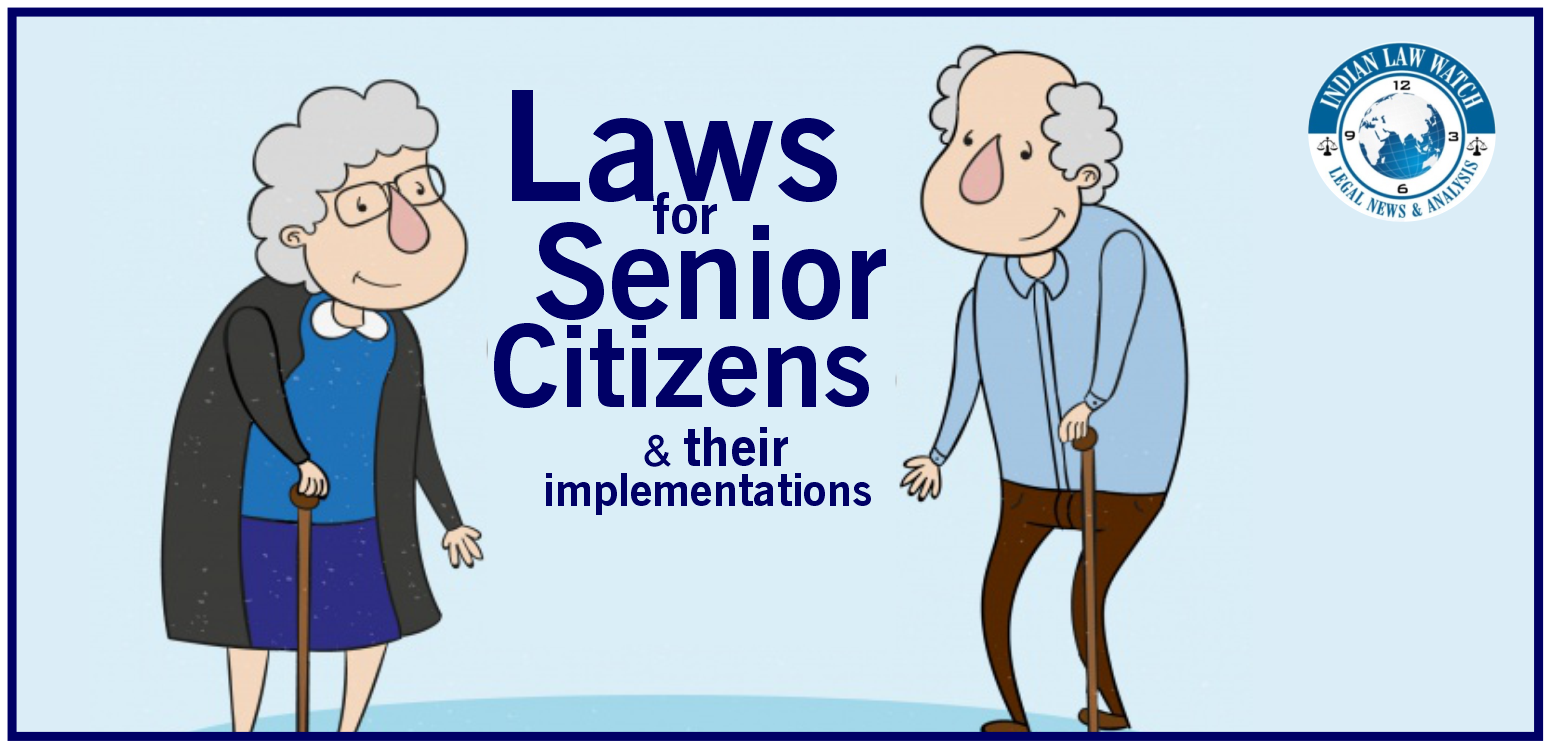The population of Elderly people in India
What is the population of elderly people in India?
- The population of elderly people ( aged 60+ ) in India can be divided into urban and rural. The following table displays the figures in millions.
- From the table below we can draw that, the rural elderly population is greater than the elderly population in urban areas. And the female population exceeds the population of elderly males.
| People aged 60+ ( in millions) | Males
(Millions) |
Females
(Millions) |
Total
(Millions) |
|
15.1 | 15.5 | 30.6 |
|
36.0 | 37.3 | 73.3 |
|
51.1 | 52.8 | 103.9 |
Laws in India for Senior Citizens
In a country like India, where the elderly population is large, laws are required to protect their rights.
- The Indian constitution has certain provisions for the weaker sections.
- There are provisions for elderly people even in the personal laws of different religious groups: Hindus, Muslims.
The following provisions have been explained further below :
Indian Constitution
| Article | Provision |
|
|
|
|
- These provisions are a part of Chapter IV of the Constitution; The Directive Principles. (*the Directive Principles are not enforceable by a court of law, but are guidelines that tell the state what it should do.)
Personal Laws
- Hindu Law
- Section 20 of Chapter III ( Maintenance ) of “The Hindu Adoptions and Maintenance Act, 1956” talks about the maintenance of children and aged parents.
- According to Section 20(1): “Subject to the provisions of this section a Hindu is bound during his or her lifetime, to maintain his or her legitimate or illegitimate children and his or her aged or infirm parents”
- “Parent” includes a childless stepmother.
-
Muslim law
According to Muslim law, children have to maintain their parents and grandparents in need. In Islam, children have a right to be maintained by their parents and have a duty to maintain their parents too.
Rules for maintenance under Muslim Law are as follows:
(1) The children are bound to maintain their parents only if they are in easy circumstances and the parents are poor. In other words, only needy parents are entitled to get maintenance from their children. By easy circumstance is meant a circumstance in which a person need not depend on begging for his livelihood. On the other hand, a person is needy or necessitous if he has to beg for his livelihood.
(2) Sons and daughters, both are equally liable to maintain their parents. There is no difference between a son and a daughter in respect of this liability; their responsibility to maintain the parents is joint and equal. But, if a child is poor and the other is in easy circumstances, the liability lies on the child who is in easy circumstances.
(3) A son, though poor and is in strained circumstances, is bound to maintain his mother, if she is poor. A son, who is poor but is earning something, is bound to support his poor father who earns nothing.
(4) If a child is in a position to support only one of its parents, the mother gets priority over the father. But, under the Ithna Asharia Shia law, the child may distribute the maintenance allowance between fathers and mother equally, if both of them are needy.
(5) If the children are unable to support their parents separately, they may be compelled to take their parents with them and to live together.
(6) A son is not bound to maintain his step-mother. Thus, he is not bound to maintain that wife of his father who is not his own mother. Where a father has two or more wives, the maintenance of one should be delivered to him to dispense among all of them.
(7) Even if the religion of the parents differs from that of the children the parents are entitled to be maintained, provided they are poor.
The Code of Criminal Procedure, 1973
- It is also essential that the parent establishes that the other party has sufficient means and has neglected or refused to maintain his, i.e., the parent, who is unable to maintain himself.
- Even daughters, including married daughters, have the duty to maintain their parents
- Section 125 of The CrPC talks about maintenance. Section 125(1)(d) states :
“his father or mother, unable to maintain himself or herself, a Magistrate of the first class may, upon proof of such neglect or refusal, order such person to make a monthly allowance for the maintenance of his wife or such child, father or mother, at such monthly rate not exceeding five hundred rupees in the whole, as such Magistrate thinks fit, and to pay the same to such person as the Magistrate may from time to time direct: Provided that the Magistrate may order the father of a minor female child referred to in clause (b) to make such allowance until she attains her majority if the Magistrate is satisfied that the husband of such minor female child if married, is not possessed of sufficient means.” If the order of the magistrate regarding allowances is not followed, then the individual can be jailed.
The Maintenance and Welfare of Parents and Senior Citizens Act, 2007
- This Act was passed by the legislature in 2007 and was implemented from 2008. Eleven states have been implementing this since 2008 only.
- This act was passed to provide more effective provision for the maintenance and welfare of parents and senior citizens. This Act made it a legal obligation for children to maintain their parents.
The role of the police, the setting up of the senior citizen tribunals and the actual implementation of the act in India, has been talked about below.
Working of the Police System in the implementation
What is the role of the police in implementing these elderly laws?
- The crimes against senior citizens should be reported to the police, which the police stations must report to the district superintendent of police on a monthly basis.
- According to the rules, it is mandatory for the police stations to must have records of all the senior citizens under their jurisdiction.
Senior Citizen Maintenance Tribunal order
- Under the Maintenance and Welfare of Parents and Senior Citizens Act, 2007, senior citizen tribunals must be established, which should take care of the aggrieved parent’s food, shelter, clothing and healthcare requirements. Nineteen states and six union territories of India have been implementing this Act.*
- These states include :
- Andhra Pradesh
- Assam
- Bihar
- Chhattisgarh
- Goa
- Haryana
- Jharkhand
- Karnataka
- Kerala
- Madhya Pradesh
- Nagaland
- Odisha
- Punjab
- Rajasthan
- Sikkim
- Tamil Nadu
- Tripura
- Uttarakhand
- West Bengal
The union territories include :
- Andaman and Nicobar Island
- Chandigarh
- Dadra and Nagar Haveli
- Daman and Diu
- Delhi
- Pudducherry
*The information above is given by the Minister of State for Social Justice and Empowerment.
- Other states are in the process of framing appropriate rules for this act.
STATUS OF PROCESS OF IMPLEMENTATION IN OTHER STATES
- Uttar Pradesh, the most populous state in India, is still in the process of implementing this Act. But, even after ten years of the passing of the Act, this process has not yet started in many districts of Uttar Pradesh.
- No meetings have been held in some districts in Uttar Pradesh regarding senior citizens including Noida. The awareness level regarding senior citizen laws is very low.
Protection of Senior Citizens in The United States
A national study in America found out that 90% of the elder abusers are family members only. To protect vulnerable senior citizens from predatory financial schemes and physical and emotional abuse, the Senate passed Acts to protect senior citizens in 2015.













Add Comment